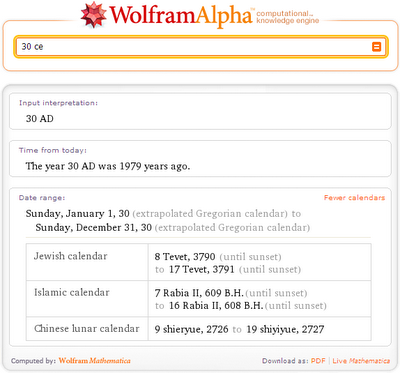 There has been considerable buzz lately about WolframAlpha, a "computational knowledge engine." Designed by the brilliant guy who developed Mathematica used in serious mathematical calculations, it is a web search engine that, unlike Google and others, does not direct you to other sites (though it does sometimes offer to send you to Wikipedia), but attempts to calculate and compute your query and return what you actually are hoping to find. It has just gone live today (2009.05.18) on the web, and I thought I would run some biblically related queries through it to see what value it might have for the kind of work I do.
There has been considerable buzz lately about WolframAlpha, a "computational knowledge engine." Designed by the brilliant guy who developed Mathematica used in serious mathematical calculations, it is a web search engine that, unlike Google and others, does not direct you to other sites (though it does sometimes offer to send you to Wikipedia), but attempts to calculate and compute your query and return what you actually are hoping to find. It has just gone live today (2009.05.18) on the web, and I thought I would run some biblically related queries through it to see what value it might have for the kind of work I do.
A query for "Bible" turned up this result. Not much there... but its attention to the sales number hints at what WolframAlpha is more interested in.
I tried searching the "Gospel of Mark," and it did not understand my query. Looking for "Qumran" did no better.
 WolframAlpha does like things related to dates. "30 ce" will get you the following.
WolframAlpha does like things related to dates. "30 ce" will get you the following. Also check entities that are associated with dates, e.g., "Roman Empire."
Also check entities that are associated with dates, e.g., "Roman Empire."
It does seem heavily tilted to USA-centric matters, and it does best at things requiring computational work: numbers, dates, and especially business matters. It has some adeptness with geographical concerns. I tried "jerusalem to jericho." It assumed Jerusalem, Israel and Jericho, New York, but it understood that I may have intended a different Jericho and provide a link to correct it to Ariha, West Bank. Here is the result, and it helpfully provided distance, local times, a map, populations, and elevations.
It also can compute n-grams. According to Wikipedia, "N-gram models are a type of probabilistic model for predicting the next item in a sequence. n-grams are used in various areas of statistical natural language processing and genetic sequence analysis." I was pleased to see that WolframAlpha is unicode-friendly, so it was able to accept unicode Greek. Here is the n-gram of John 1.1 in the Greek. Perhaps linguists will be excited about the potential for this tool, but this word-level bigram can give you an idea of what it might be able to do.
 BOTTOM LINE: WolframAlpha is not going to replace Google or other search engines you may be using for doing research related to biblical studies. It does have some interesting potential for computations involving dates or words. Play around with it and let us know if you discover something unique that it can do for the biblical studies field.
BOTTOM LINE: WolframAlpha is not going to replace Google or other search engines you may be using for doing research related to biblical studies. It does have some interesting potential for computations involving dates or words. Play around with it and let us know if you discover something unique that it can do for the biblical studies field.








Cool post! I have heard of this, and it's being touted as a replacement for Google and Wikipedia. But I guess those are pretty large shoes to fill. Will give it a try too. Thanks! :)
ReplyDelete